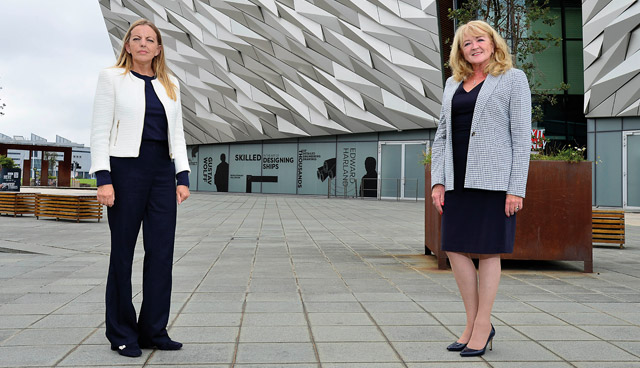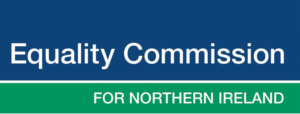Protecting your rights after Brexit: One year on

Geraldine McGahey, Chief Commissioner of the Equality Commission for Northern Ireland, highlights the importance of the UK Government’s commitment in Article 2 of the Ireland/Northern Ireland Protocol to protect our equality and human rights post-Brexit, and outlines the work that the Commission, together with the Northern Ireland Human Rights Commission, has undertaken over the last year to ensure this commitment is upheld.
What is the UK Government’s commitment in the Protocol?
The UK Government made an important commitment in Article 2 of the Protocol to ensure that many of our equality and human rights in Northern Ireland will continue to be protected after Brexit.
Specifically, the Government committed to ensuring that protections regarding the rights, safeguards and equality of opportunity, set out in the relevant chapter of the Belfast (Good Friday) Agreement, are not reduced as a result of Brexit.
This means that some of our key equality rights that are underpinned by EU anti-discrimination laws, including those on the grounds of gender, including transgender, sexual orientation, disability, age, racial or ethnic origin and religion and belief, cannot be reduced due to Brexit.
There are other EU laws which are also covered by this commitment, including those relating to: parental leave, the rights of victims and the rights of pregnant workers, as well as specific measures aimed at protecting the rights for disabled people.
The UK Government has also committed to making sure that certain equality laws here will keep pace with any future changes to specific EU anti-discrimination laws. So, if the EU strengthens these laws, our equality laws must be similarly strengthened.
This is an important commitment, as there were concerns that equality and human rights may be reduced after the UK left the EU. It is also a recognition of the importance and centrality of rights and equality protections in the Belfast (Good Friday) Agreement and of the fact that this agreement has underpinned the peace process here.
Significantly, neither the Northern Ireland Assembly, nor the Northern Ireland Executive, can act in a way that is incompatible with the UK Government’s commitment. If they do, those actions can be challenged in our courts, by way of judicial review proceedings.
This commitment, therefore, has significant implications for the work of the Assembly, Executive Ministers and departments, including as they develop, consult on and introduce new legislation. They must ensure that this legislation complies with the UK Government’s commitment under the Protocol.
What is the role of the Commissions?
We have been given new powers and duties, to enable us and the Northern Ireland Human Rights Commission to oversee the implementation of its commitment. We have a responsibility to monitor, provide advice, report and ensure the UK Government’s commitment is upheld. We can use our powers together or separately.
The Commissions also work closely with the Irish Human Rights and Equality Commission on oversight of rights and equalities issues falling within the scope of the commitment that have an island of Ireland dimension.
Our powers include providing legal advice, assistance to individuals and, where appropriate, support for legal proceedings where we believe the UK Government’s commitment has been breached. We also have the power to bring legal challenges in our own name or intervene in legal cases.
What type of work have we taken forward?
A key focus of our work to date has been informing people of their rights after Brexit, through a range of means including public advertising.
We have also met with a wide range of stakeholders to hear about their concerns and to help us understand and assess the impact of Brexit on equality groups in Northern Ireland. We have raised their issues with relevant ministers and government officials and called for urgent action to address these concerns.
In addition, we have closely monitored draft legislation that has been progressing through the Assembly and Westminster to assess its compliance with the Government’s commitment. We have engaged with, and advised, relevant parliamentary committees on these issues.
We have also engaged with government officials to highlight the implications of the UK Government’s commitment on the work of government, including departments, and to encourage them to embed Article 2 considerations into policy and legislative proposals.

Chief Commissioner, Equality Commission for Northern Ireland.
“Together with the Northern Ireland Human Rights Commission, we will continue to closely monitor the impact of Brexit on everyone here and specifically any impacts on equality groups.”
Issues we have raised include concerns from disabled people with assistance dogs about additional requirements and checks being introduced for travelling between Great Britain and Northern Ireland. We urgently require formal agreement between the UK Government and the EU to ensure there are no adverse impacts on assistance dog owners here.
We are also working with equality groups, including those from the disability and women’s sectors, over the potential impact of the loss of the EU funding. The European Social Fund is due to close in March 2023, with no clear replacement announced as yet, and any shortfall is likely to impact many sectors.
To assess the potential impact, we have commissioned research on the impact of the loss of EU funding on equality groups and we will use this evidence to report and make future recommendations to government.
We are also working with faith-based communities experiencing difficulties accessing specific foods. Post-Brexit, the supply of some kosher and halal foods from Great Britain has been severely affected. Together with our Jewish and Muslim communities, we are calling for this to be addressed urgently.
Both Commissions are also working with the Irish Human Rights and Equality Commission on equality and human rights issues that have an all-Ireland dimension, including research on the potential divergence of rights across Ireland as a result of Brexit.
We are working with people living in border communities, as well as their representative organisations, regarding their concerns about the impact of Brexit on their daily lives. This includes cross border travel and access to cross border services such as healthcare, education and work.
We have been looking at issues such as the rights of minority ethnic people and migrant workers, and concerns about increased racial profiling in terms of cross-border travel.
What happens next?
Together with the Northern Ireland Human Rights Commission, we will continue to closely monitor the impact of Brexit on everyone here and specifically any impacts on equality groups. We will identify and highlight new issues and concerns that impact on people’s lives and use our powers, including our enforcement powers, strategically and robustly to hold the UK Government to account.
We have been tasked with a challenging and critical role and, in close partnership with the Northern Ireland Human Rights Commission, we will work to carry out that role and ensure that all of our equality and human rights are protected after Brexit.
Further information is available on the Commissions’ websites or by contacting:
ECNI:
T: 028 9050 0600
E: DMU@equalityni.org
W: www.equalityni.org/brexit
NIHRC:
T: 028 9024 3987
E: info@nihrc.org
W: www.nihrc.org/human-rights-after-brexit







